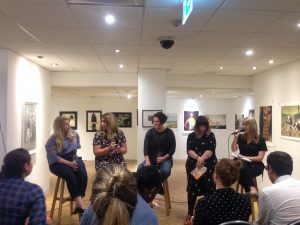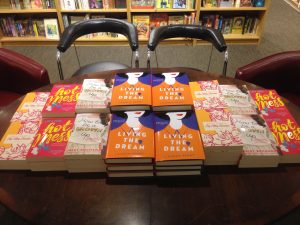
The panel of How to Survive Your Twenties.
A couple of weeks ago I headed to the stunning Gower Street Waterstones in central London, to attend the How To Survive Your Twenties talk, hosted by Daisy Buchanan, Emily Morris, Lucy Vine, and Lauren Berry. The panel discussed everything from FOMO (fear of missing out), dealing with the unexpected, relationships and friendships – all from a female point of view. This special event, surrounded by the incredible books written by the panel members, brought up the issues girls face when navigating the difficult decades of your teen and twenties years.
The event started with an introduction from event organiser Elizabeth Morris, giving a glowing review of all of the panelists novels, as well as a chapter reading of each of the books by their authors. Most well-known from the panel is Daisy Buchanan, author of How to be a Grown Up, award-winning journalist, and Grazia agony-aunt. An event called How To Survive Your Twenties wouldn’t be complete without Daisy Buchanan. However, I was most excited to see Lauren Berry, the founding editor of satirical feminist magazine KnockBack. As a long time reader of the magazine, it was fascinating to the woman who started it all. I’m definitely keen to now read her debut novel, Living the Dream. I’ll admit I’d not heard of the panelist Emily Morris, author of My Shitty Twenties, but now I’ve seen her talk I’m going to take a look at her work – she was fascinating speaking about issues of body issues that young girls and women can face. As a young single mother when she was in her twenties, Emily spoke about the FOMO of living a different life to her friends when she was in the formative years of her twenties, and how that decade isn’t really adulthood at all but an extension of girlhood adolescence.
I‚Äôve also recently read Hot Mess, the debut novel from panelist Lucy Vine, who is impressively also an editor and columnist. Hot Mess is a coming-of-age story, following Ellie Knight navigate the job she hates as a single-girl heroine. The book has been called the “Bridget Jones” of the modern-age, and while I don‚Äôt think that is the most flattering of comparisons, I loved Hot Mess. While it‚Äôs certainly too risqu√© in parts to fall into the YA category, Hot Mess would be a book I‚Äôd recommend to older teen girls. What the book does well, which other books frequently do not, is share the message that it is fine to not have the perfect life and to not have a happy-ever-after at the end. Unlike it‚Äôs Bridget Jones comparison, protagonist Ellie Knight doesn‚Äôt end up with a boyfriend at the end of the novel. What Ellie does do, however, is land a great job, fix her troubled friendships, and build a bond with her family. While in parts she is certainly not a role-model for young girls, by the end her resilience show she certainly is.
Predictably and understandably, the conversation next got onto the topic of the impact of feminism to girlhood-come-adulthood. Lauren Berry made a contribution to this section of the talk, speaking about her novel Living The Dream and the comparison made by reviewers to Bridget Jones, ironically with Lucy Vine’s Hot Mess been given the same comparison. The two explained that while the comparison of the success could be flattering, it is important to notice that any successful book, film, or TV show is compared to either Sex and the City, Bridget Jones, or Lena Dunham’s Girls. Only having three recognisable comparisons for female-led media is a huge issue, and one that Lucy and Lauren spoke about. This, of course, impacts young girls as there is a distinct lack of (obvious) role models in mainstream media.
The question and answer end to the evening was the most illuminating, with event organiser Elizabeth Morris asking “how do we find courage in our twenties”? Fascinatingly, the panel was pretty unanimous. Daisy replied that it’s important to remember that we don’t really matter that much, in a good way Р“you can do what you want because we don’t really matter that much to anybody, and that’s great and liberating and giddy. Thinking we matter will crush creativity.”
 The event ticket, of only ¬£6, could even be reimbursed to purchase a book ‚Äì brilliant! So, after browsing for far too long, I chose Daisy Buchanan’s How To Be A Grown Up. I‚Äôve wanted this book for a while, and ¬£6 off was a good enough excuse to finally get it. Described as ‚Äúa comforting, witty, supportive book for real twenty-something women who want to discover how they can reach the end of the ‘fun’ decade knowing exactly who they are‚Äù, I knew I wanted it. How to be a Grown Up is essentially the best-friend you turn to for advice when girlhood-come-adulthood is all a bit too much. But, I easily could‚Äôve bought all of the panelists books after hearing their readings.
The event ticket, of only ¬£6, could even be reimbursed to purchase a book ‚Äì brilliant! So, after browsing for far too long, I chose Daisy Buchanan’s How To Be A Grown Up. I‚Äôve wanted this book for a while, and ¬£6 off was a good enough excuse to finally get it. Described as ‚Äúa comforting, witty, supportive book for real twenty-something women who want to discover how they can reach the end of the ‘fun’ decade knowing exactly who they are‚Äù, I knew I wanted it. How to be a Grown Up is essentially the best-friend you turn to for advice when girlhood-come-adulthood is all a bit too much. But, I easily could‚Äôve bought all of the panelists books after hearing their readings.
Overall, the How To Survive Your Twenties talk with Daisy Buchanan, Emily Morris, Lucy Vine, and Lauren Berry was a success. The age of teen and early twenties is often portrayed in culture as an extreme, either as the perfect period of friendships and relationships, or as a tumultuous time of chaos. What How To Survive Your Twenties and Hot Mess show, however, is that for most people most of the time it’s somewhere in between. It’s cliché to say it’s a period of finding out who you are, but it’s a cliché because it’s true. What Daisy Buchanan, Emily Morris, Lucy Vine, and Lauren Berry come to conclude is that it’s cemented into culture that the teenage period is tumultuous and difficult, but that that awareness is not taken into the idea of your twenties. It’s the decade of being expected to be an adult, not quite knowing how, and feeling like a failure. The evening was enlightening and full of important messages for girls in their twenties.
-Chloe Turner
Volunteer & Instagram Manager
Girl Museum Inc.

Really wish I could have been there! Also, really enjoying Hot Mess, I’d definitely encourage others to read too. Thanks for the recommendation Chloe!